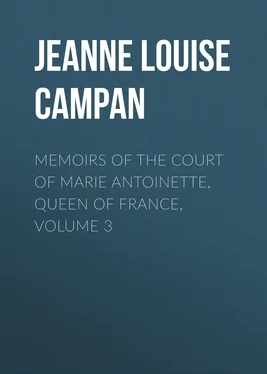Jeanne Louise Henriette Campan - Memoirs of the Court of Marie Antoinette, Queen of France, Volume 3
Здесь есть возможность читать онлайн «Jeanne Louise Henriette Campan - Memoirs of the Court of Marie Antoinette, Queen of France, Volume 3» — ознакомительный отрывок электронной книги совершенно бесплатно, а после прочтения отрывка купить полную версию. В некоторых случаях можно слушать аудио, скачать через торрент в формате fb2 и присутствует краткое содержание. Жанр: Биографии и Мемуары, История, foreign_edu, foreign_antique, foreign_prose, на английском языке. Описание произведения, (предисловие) а так же отзывы посетителей доступны на портале библиотеки ЛибКат.
- Название:Memoirs of the Court of Marie Antoinette, Queen of France, Volume 3
- Автор:
- Жанр:
- Год:неизвестен
- ISBN:нет данных
- Рейтинг книги:3 / 5. Голосов: 1
-
Избранное:Добавить в избранное
- Отзывы:
-
Ваша оценка:
- 60
- 1
- 2
- 3
- 4
- 5
Memoirs of the Court of Marie Antoinette, Queen of France, Volume 3: краткое содержание, описание и аннотация
Предлагаем к чтению аннотацию, описание, краткое содержание или предисловие (зависит от того, что написал сам автор книги «Memoirs of the Court of Marie Antoinette, Queen of France, Volume 3»). Если вы не нашли необходимую информацию о книге — напишите в комментариях, мы постараемся отыскать её.
Memoirs of the Court of Marie Antoinette, Queen of France, Volume 3 — читать онлайн ознакомительный отрывок
Ниже представлен текст книги, разбитый по страницам. Система сохранения места последней прочитанной страницы, позволяет с удобством читать онлайн бесплатно книгу «Memoirs of the Court of Marie Antoinette, Queen of France, Volume 3», без необходимости каждый раз заново искать на чём Вы остановились. Поставьте закладку, и сможете в любой момент перейти на страницу, на которой закончили чтение.
Интервал:
Закладка:
From the time of the Regency, and on account of the residence of the family of Orleans in the bosom of the capital, Paris had preserved a remarkable degree of attachment and respect for that branch of the royal house; and although the crown was becoming more and more remote from the Princes of the House of Orleans, they had the advantage (a great one with the Parisians) of being the descendants of Henri IV. An affront to that popular family was a serious ground of dislike to the Queen. It was at this period that the circles of the city, and even of the Court, expressed themselves bitterly about her levity, and her partiality for the House of Austria. The Prince for whom the Queen had embarked in an important family quarrel—and a quarrel involving national prerogatives—was, besides, little calculated to inspire interest. Still young, uninformed, and deficient in natural talent, he was always making blunders.
He went to the Jardin du Roi; M. de Buffon, who received him there, offered him a copy of his works; the Prince declined accepting the book, saying to M. de Buffon, in the most polite manner possible, "I should be very sorry to deprive you of it."
[Joseph II, on his visit to France, also went to see M. de Buffon, and said to that celebrated man, "I am come to fetch the copy of your works which my brother forgot."—NOTE BY THE EDITOR.]
It may be supposed that the Parisians were much entertained with this answer.
The Queen was exceedingly mortified at the mistakes made by her brother; but what hurt her most was being accused of preserving an Austrian heart. Marie Antoinette had more than once to endure that imputation during the long course of her misfortunes. Habit did not stop the tears such injustice caused; but the first time she was suspected of not loving France, she gave way to her indignation. All that she could say on the subject was useless; by seconding the pretensions of the Archduke she had put arms into her enemies' hands; they were labouring to deprive her of the love of the people, and endeavoured, by all possible means, to spread a belief that the Queen sighed for Germany, and preferred that country to France.
Marie Antoinette had none but herself to rely on for preserving the fickle smiles of the Court and the public. The King, too indifferent to serve her as a guide, as yet had conceived no love for her, notwithstanding the intimacy that grew between them at Choisy. In his closet Louis XVI. was immersed in deep study. At the Council he was busied with the welfare of his people; hunting and mechanical occupations engrossed his leisure moments, and he never thought on the subject of an heir.
The coronation took place at Rheims, with all the accustomed pomp. At this period the people's love for Louis XVI. burst forth in transports not to be mistaken for party demonstrations or idle curiosity. He replied to this enthusiasm by marks of confidence, worthy of a people happy in being governed by a good King; he took a pleasure in repeatedly walking without guards, in the midst of the crowd which pressed around him, and called down blessings on his head. I remarked the impression made at this time by an observation of Louis XVI. On the day of his coronation he put his hand up to his head, at the moment of the crown being placed upon it, and said, "It pinches me." Henri III. had exclaimed, "It pricks me." Those who were near the King were struck with the similarity between these two exclamations, though not of a class likely to be blinded by the superstitious fears of ignorance.
While the Queen, neglected as she was, could not even hope for the happiness of being a mother, she had the mortification of seeing the Comtesse d'Artois give birth to the Duc d'Angouleme.
Custom required that the royal family and the whole Court should be present at the accouchement of the Princesses; the Queen was therefore obliged to stay a whole day in her sister-in-law's chamber. The moment the Comtesse d'Artois was informed a prince was born, she put her hand to her forehead and exclaimed with energy, "My God, how happy I am!" The Queen felt very differently at this involuntary and natural exclamation. Nevertheless, her behaviour was perfect. She bestowed all possible marks of tenderness upon the young mother, and would not leave her until she was again put into bed; she afterwards passed along the staircase, and through the hall of the guards, with a calm demeanour, in the midst of an immense crowd. The poissardes, who had assumed a right of speaking to sovereigns in their own vulgar language, followed her to the very doors of her apartments, calling out to her with gross expressions, that she ought to produce heirs. The Queen reached her inner room, hurried and agitated; he shut herself up to weep with me alone, not from jealousy of her sister-in-law's happiness,—of that he was incapable,—but from sorrow at her own situation.
Deprived of the happiness of giving an heir to the crown, the Queen endeavoured to interest herself in the children of the people of her household. She had long been desirous to bring up one of them herself, and to make it the constant object of her care. A little village boy, four or five years old, full of health, with a pleasing countenance, remarkably large blue eyes, and fine light hair, got under the feet of the Queen's horses, when she was taking an airing in a calash, through the hamlet of St. Michel, near Louveciennes. The coachman and postilions stopped the horses, and the child was rescued without the slightest injury. Its grandmother rushed out of the door of her cottage to take it; but the Queen, standing up in her calash and extending her arms, called out that the child was hers, and that destiny had given it to her, to console her, no doubt, until she should have the happiness of having one herself. "Is his mother alive?" asked the Queen. "No, Madame; my daughter died last winter, and left five small children upon my hands." "I will take this one, and provide for all the rest; do you consent?" "Ah, Madame, they are too fortunate," replied the cottager; "but Jacques is a bad boy. I hope he will stay with you!" The Queen, taking little Jacques upon her knee, said that she would make him used to her, and gave orders to proceed. It was necessary, however, to shorten the drive, so violently did Jacques scream, and kick the Queen and her ladies.
The arrival of her Majesty at her apartments at Versailles, holding the little rustic by the hand, astonished the whole household; he cried out with intolerable shrillness that he wanted his grandmother, his brother Louis, and his sister Marianne; nothing could calm him. He was taken away by the wife of a servant, who was appointed to attend him as nurse. The other children were put to school. Little Jacques, whose family name was Armand, came back to the Queen two days afterwards; a white frock trimmed with lace, a rose-coloured sash with silver fringe, and a hat decorated with feathers, were now substituted for the woollen cap, the little red frock, and the wooden shoes. The child was really very beautiful. The Queen was enchanted with him; he was brought to her every morning at nine o'clock; he breakfasted and dined with her, and often even with the King. She liked to call him my child,
[This little unfortunate was nearly twenty in 1792; the fury of the people and the fear of being thought a favourite of the Queen's had made him the most sanguinary terrorist of Versailles. He was killed at the battle of Jemappes.]
and lavished caresses upon him, still maintaining a deep silence respecting the regrets which constantly occupied her heart.
This child remained with the Queen until the time when Madame was old enough to come home to her august mother, who had particularly taken upon herself the care of her education.
The Queen talked incessantly of the qualities which she admired in Louis XVI., and gladly attributed to herself the slightest favourable change in his manner; perhaps she displayed too unreservedly the joy she felt, and the share she appropriated in the improvement. One day Louis XVI. saluted her ladies with more kindness than usual, and the Queen laughingly said to them, "Now confess, ladies, that for one so badly taught as a child, the King has saluted you with very good grace!"
Читать дальшеИнтервал:
Закладка:
Похожие книги на «Memoirs of the Court of Marie Antoinette, Queen of France, Volume 3»
Представляем Вашему вниманию похожие книги на «Memoirs of the Court of Marie Antoinette, Queen of France, Volume 3» списком для выбора. Мы отобрали схожую по названию и смыслу литературу в надежде предоставить читателям больше вариантов отыскать новые, интересные, ещё непрочитанные произведения.
Обсуждение, отзывы о книге «Memoirs of the Court of Marie Antoinette, Queen of France, Volume 3» и просто собственные мнения читателей. Оставьте ваши комментарии, напишите, что Вы думаете о произведении, его смысле или главных героях. Укажите что конкретно понравилось, а что нет, и почему Вы так считаете.












